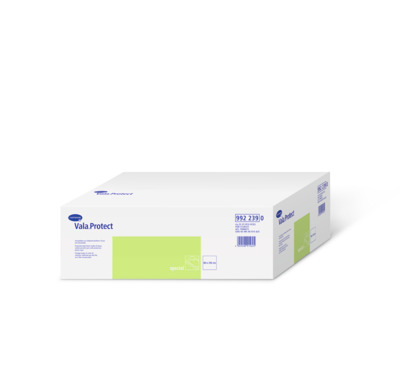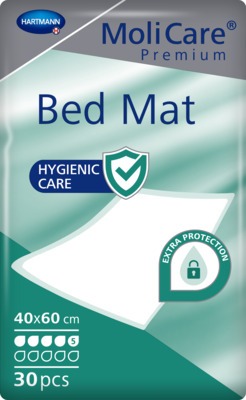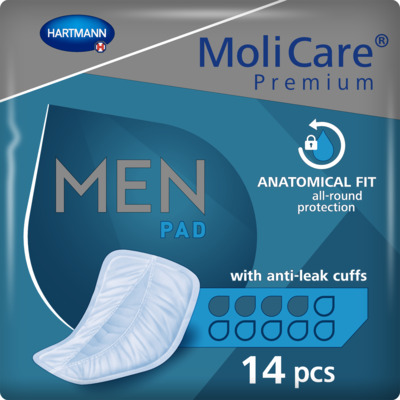Incontinence Advice
Dealing With Incontinence Anxiety
Incontinence anxiety, also known as bladder anxiety, is a common condition among people with incontinence. According to the NHS, an estimated 3 to 6 million people in the UK experience some form of urinary incontinence[i], with anxiety and depression commonly associated with this condition. In fact, a study of 12,568 women revealed that 56.6% of participants were showing signs of anxiety[ii]. Incontinence anxiety can have a significant impact on an individual's quality of life, leading to social isolation, depression, and a loss of confidence. However, there are many strategies and treatments available to help manage incontinence anxiety and improve overall well being. In this article, we will explore the causes, symptoms, and treatments for incontinence anxiety, as well as tips for reducing anxiety and improving bladder control.

What Is Incontinence Anxiety
Incontinence anxiety is a psychological condition characterised by an overwhelming fear of experiencing urinary or faecal leakages in public situations. In some cases, this incontinence anxiety can become so intense that it leads to the person avoiding social situations and can significantly impact a person's quality of life.
Incontinence anxiety is not the same as urinary or faecal incontinence. Incontinence anxiety is a condition that a person can develop, as a perception of potential bladder leakages in social situations or past experiences with incontinence. If you are suffering from incontinence, you can use our adult nappies to help you manage your symptoms.
What Is The Difference Between Anxiety Incontinence and Incontinence Anxiety
Anxiety incontinence and incontinence anxiety are two distinct conditions that can be easily confused. However, understanding the difference is important.
Anxiety incontinence is a type of urinary incontinence that occurs as a result of anxiety or panic. This condition is characterised by a sudden and urgent urge to urinate (wee), even if the bladder is not full, which can lead to leakage or even complete loss of bladder control. Anxiety incontinence is a physical condition caused by changes in the body's response to stress and anxiety.
On the other hand, incontinence anxiety is a psychological condition characterised by fear and anxiety related to the potential of experiencing incontinence in public situations. People with incontinence anxiety may not actually experience incontinence, but their fear of it can cause significant distress and avoidance of social situations. Unlike anxiety incontinence, incontinence anxiety is a psychological condition that is not directly caused by physical changes in the body.
Read More: Anxiety Incontinence: How Does Anxiety Affect The Bladder & Bowel?
Dealing with incontinence anxiety
- References
- What Is The Difference Between Anxiety Incontinence and Incontinence Anxiety
- What Is Incontinence Anxiety
- Incontinence Anxiety Causes
- Symptoms of Incontinence Anxiety
- Can Incontinence Anxiety Be Diagnosed
- Tips For Easing and Treating Incontinence Anxiety
- Managing Incontinence Anxiety
- FAQs
Incontinence Product Finder
Selecting the right products is key in ensuring security and discretion. If you’re not quite sure what you need, try our product finder. It’ll ask you a few questions about your needs and then provide a list of recommended products that may help you.
Find Product Incontinence Product FinderIncontinence Anxiety Causes
Unfortunately, there has not been enough research to determine the exact causes of incontinence anxiety. However, experts have identified several factors as potential contributors, including:
● Previous experience or trauma: Individuals who have experienced urinary or faecal incontinence, particularly in public situations, may be more likely to develop incontinence anxiety.
● Family history: Paruresis, which is the fear of urinating in public, may be learned in childhood from the behaviour of close family members. A child may learn to interpret going out as unsafe and develop their own fears about incontinence if a close family member experiences incontinence anxiety.
● Comorbid physical conditions: Physical conditions such as advancing age, diabetes, lower urinary tract symptoms, infections, pregnancy and childbirth, hysterectomy, prostatectomy, and neurological disorders such as multiple sclerosis and Parkinson's disease can contribute to the development of incontinence anxiety.
● Psychological difficulties: Incontinence anxiety is likely to be associated with a number of other psychological conditions, including social anxiety disorder, obsessive-compulsive disorder and depression.
● Impact of anxiety on bladder and bowel function: Anxiety, regardless of its cause, can impact the function of the bladder and bowel through a series of physiological processes, which can increase the risk of incontinence.
To determine the cause of your incontinence anxiety, it would be most beneficial to discuss your symptoms with your doctor.

Symptoms of Incontinence Anxiety
Anxiety and the bladder are closely linked, and anxiety can cause a person to experience a range of urinary symptoms. These symptoms can be both physical and emotional and have a significant impact on their quality of life. Here are some of the common symptoms experienced by individuals with incontinence anxiety:
● Overwhelming fear of incontinence in public situations
● Frequent worry and anxiety about having an accident or leakage
● Avoidance of social situations due to fear of incontinence
● Hypervigilance to bodily sensations related to bladder or bowel function
● Repeatedly checking whether the bladder or bowel is empty
● Difficulty sleeping due to anxiety about incontinence
● Feelings of shame, embarrassment, and low self-esteem
● Negative impact on social, professional, and personal relationships
● Physical symptoms of anxiety, such as sweating, nausea and an increased heart rate
Can Incontinence Anxiety Be Diagnosed
Currently, there are no standardised diagnostic criteria available for incontinence anxiety. However, a doctor may diagnose incontinence anxiety based on the presence of anxiety symptoms that are known to significantly interfere with an individual's daily life and activities. These symptoms may include overwhelming fear of incontinence in public situations, avoidance of social activities or places due to the fear of incontinence, and a negative impact on social and work relationships.
Furthermore, a doctor may also consider other factors when diagnosing incontinence anxiety, including the severity, frequency and duration of symptoms and any underlying physical or psychological conditions. It is important to note that a thorough evaluation is necessary to rule out other medical conditions that may cause similar symptoms.
Incontinence Product Finder
Selecting the right products is key in ensuring security and discretion. If you’re not quite sure what you need, try our product finder. It’ll ask you a few questions about your needs and then provide a list of recommended products that may help you.
Find Product Incontinence Product FinderTips For Easing and Treating Incontinence Anxiety
Although experiencing anxiety and incontinence can be embarrassing and troublesome, there are several ways that you can manage your symptoms and treat the condition. However, some treatments and aids will help your condition, while others may not prove helpful. So, try some of our suggestions for easing and treating incontinence anxiety to help ease your symptoms.
1. Take Preventative Measures
Incontinence anxiety usually occurs in those who have had bad experiences with incontinence, and as a result are worried about negative and potentially embarrassing situations arising in the future. However, if you take preventative measures to reduce the chances of such circumstances happening, you may be able to find better peace of mind and ease your anxiety. Fortunately, there are plenty of preventative measures that can help reduce your incontinence symptoms. For example, there are products such as incontinence pads and incontinence pants that you can wear to reduce leakages and dietary changes you can make to reduce symptoms, including drinking plenty of fluids and avoiding bladder irritants.
Read More: Bladder Friendly Drinks - The Best Drinks To Stay Healthy
and Hydrated
2. Seek Treatment For Your Symptoms
Seeking treatment for anxiety incontinence and its symptoms can help you to manage and potentially improve your condition. There are several treatment options available for incontinence anxiety, and they may include medications to reduce bladder contractions, physical therapy to strengthen pelvic floor muscles, and surgical interventions depending on the underlying cause of the incontinence. To determine the best treatment for you, you should seek professional help through a doctor.
3. Start Doing Pelvic Floor Exercises
Pelvic floor exercises are incredibly beneficial, as they strengthen the muscles that support the bladder and bowel. This reduces the risk of incontinence leakages, helping to ease your anxiety. Usually, these exercises involve contracting and relaxing the pelvic floor muscles, which can be done anywhere and at any time. Also, pelvic floor exercises can help with the sensation of urgency and anxiety associated with incontinence.
4. Practice Yoga
Practising yoga can help improve mindfulness and relaxation, reducing anxiety associated with incontinence. Yoga poses that focus on the pelvic area, such as the bridge pose and pelvic tilt, can also help strengthen the pelvic floor muscles. Some more of the best yoga poses to help strengthen the pelvic floor include:
● Chair pose
● Triangle pose
● Mountain pose
● Supported bridge pose
● Corpse pose[iii]
5. Maintain Social Connections and Activities
Social support is crucial when it comes to coping with anxiety urination. Maintaining relationships with friends and family will help avoid feelings of isolation, and attending support groups with others who are going through the same struggles can also provide a sense of community and validation. Also, engaging in social activities can serve as a distraction from anxiety and help boost overall mood and well-being.
Managing Incontinence Anxiety
Incontinence anxiety can significantly affect a person's quality of life and lead to embarrassment, social isolation, and a decreased desire to participate in activities that one once enjoyed. However, there are several ways to manage and overcome this anxiety. With proper treatment and management techniques, it is possible to live a fulfilling and enjoyable life. Remember that you are not alone, and there are many resources available to help you manage symptoms of anxiety urination.

FAQs
Does Anxiety Cause Incontinence?
Anxiety can be a contributing factor to incontinence in some cases. When someone experiences anxiety or stress, their body's "fight or flight" response is activated, which can cause the muscles in the body to tense up. In some cases, this can include the muscles that control the bladder and bowel. This tension can lead to urinary urgency, frequency, or even leakage, particularly in individuals who already have a weak pelvic floor or underlying medical conditions that affect bladder control.
Additionally, anxiety disorders such as panic disorder, generalised anxiety disorder, and post-traumatic stress disorder (PTSD) have been linked to an increased risk of developing urinary incontinence. However, not everyone who has incontinence will experience anxiety, and vice versa.
Can Incontinence Be Psychosomatic?
Yes, incontinence can be psychosomatic. Psychosomatic incontinence refers to bladder control problems that are caused by psychological factors such as stress, anxiety, or depression. These psychological factors can affect the way the brain signals the bladder to empty or weaken the pelvic floor muscles, leading to urinary incontinence. However, if you are experiencing symptoms of urinary incontinence, it’s important to get a medical opinion before brushing off your symptoms as psychosomatic.
Can anxiety make you wee more?
When we are anxious, our bodies react in several different ways, such as sweating, muscle tension and an increased heart rate. Unfortunately, these can affect the muscles that control your bladder and lead to urinary incontinence, particularly if you already have a weak pelvic floor or an underlying medical condition that affects bladder control.
Sources
[i]NHS Inform Scotland. (2021). Urinary incontinence.
Retrieved from https://www.nhsinform.scot/illnesses-and-conditions/kidneys-bladder-and-prostate/urinary-incontinence

ValaProtect Bed Sheets

MoliCare Premium Bed Mat 5 Drops
<h2>Hygienic care and protection whilst asleep</h2> <p>We are forever looking for new ways to help and improve the lifestyle for people living with accidents in the night no matter what their age. And we know that weeing in your sleep can affect anyone at any age for a variety of reasons, disturbing sleep and causing embarrassment. Add an extra layer of protection with MoliCare® Premium Bed Mat 5 Drops, which is designed to help people managing bladder weakness and incontinence or those caring for children and loved ones. These bed mats offer an extra layer of safeguarding, protecting surfaces from leaks with their waterproof backing and effective liquid absorption provided by the fluff core.</p> <h2>Choose MoliCare®</h2> <p>Key features of using the MoliCare® Premium Bed Mat 5 drops include:</p> <ul> <li>Hygienic, protecting mattresses and added protection for those with bladder weakness and incontinence or caregivers looking after loved ones.</li> <li>Available in various sizes and absorbencies to suit individual needs and preferences.</li> <li>Versatile protection for beds, chairs, furniture, and other surfaces, ensuring cleanliness and peace of mind.</li> <li>Featuring an absorbent core, these disposable bed mats offer an extra layer of security, preventing leaks and spills effectively.</li> <li>Experience discreet comfort with the soft top sheet and cotton-like back sheet, ensuring a pleasant user experience.</li> </ul> <p>MoliCare® Premium Bed Mat 5 Drops is the ultimate reliable and practical solution for bed hygiene and protecting surfaces from any accidents or leaks. Whether for personal use, children or caregiving older adults, these bed mats provide added peace of mind, allowing you or your loved ones to rest comfortably and worry-free. Embrace the convenience and comfort of MoliCare® Premium Bed Mat 5 Drops and ensure a clean and protected environment for all. Order today and receive free standard UK delivery when you spend £50 or more, or opt for next working delivery. Stay safe and secure on the go with HARTMANN Direct and MoliCare®.</p>
MoliCare® Premium Men Pad 4 Drops
<h2>Comfortable and absorbent</h2> <p>Why MoliCare for men? Hers are some of the key features of the MoliCare® Premium Men Pads from Hartmann:</p> <ul> <li>Discreet and comfortable</li> <li>Fits the male physique</li> <li>3-layer absorbent core</li> <li>Fast-absorbing system</li> <li>Anti-leakage cuffs</li> <li>Odour neutralisers</li> <li>Wide adhesive strip</li> <li>Skin-friendly</li> </ul> <p>With an affordable price and great quality guarantee, you cannot regret choosing MoliCare® Premium Men Pad 4 drops, equipped with anti-leak cuffs, and 14 pieces per bag.</p> <h2>Slim and discreet under clothing</h2> <p>MoliCare® Premium MEN Pads offer reliable support for men dealing with bladder weakness. Whether it's stress incontinence or urge incontinence, these pads for men are designed to provide a discreet and quick solution on the go. Simply place the pad before applying your underwear and secure it with the adhesive strip for worry-free protection. MoliCare® Premium MEN Pads offer full coverage for men facing very light to moderate bladder weakness.</p> <h2>Leakage protection for men</h2> <p>MoliCare® understands that each individual's incontinence needs are unique. That's why our incontinence products, including MoliCare® Premium MEN Pads, are available in different absorbency levels. You can find the perfect fit and protection for your specific requirements.</p> <h2>Reliable and soft on the skin</h2> <p>Our body-shaped absorbent pads are designed to deliver dependable and skin-friendly incontinence protection every day. Experience discreet comfort with the soft, cotton-like materials and the added benefit of an odour neutraliser, ensuring you feel fresh and confident throughout the day.</p> <h2>Fast delivery to your home</h2> <p>At HARTMANN Direct, we ensure a fast delivery service for all our products. Enjoy free delivery on orders over £50, making it convenient and hassle-free to receive the incontinence products you need. Our dedicated customer care team is here to discuss your incontinence product needs and answer any questions you may have. Call us today on 0800 028 9470 to experience the comfort and confidence that MoliCare® Premium MEN Pads can provide.</p>
